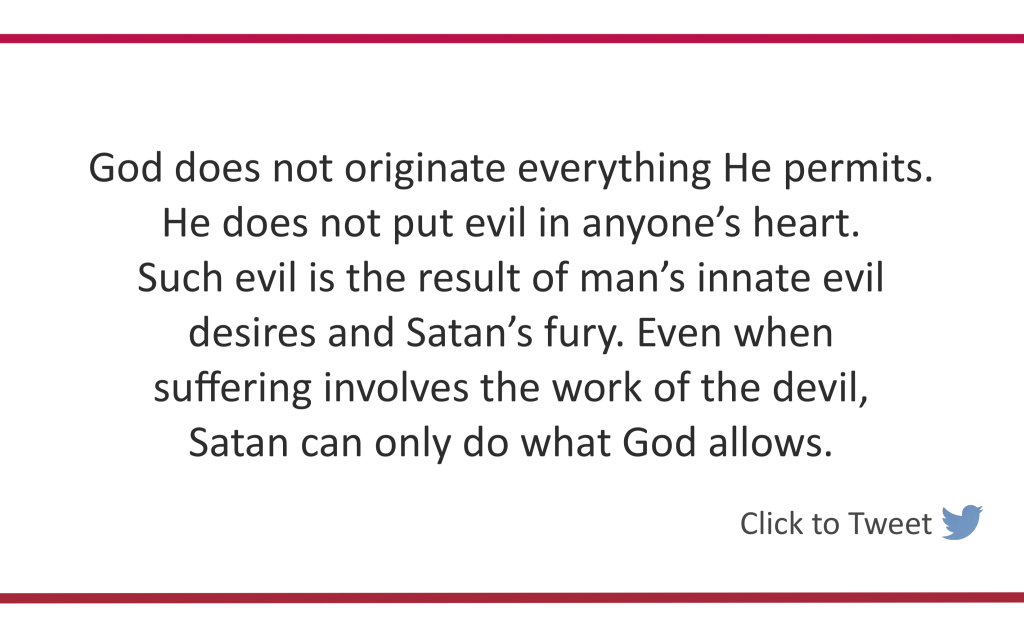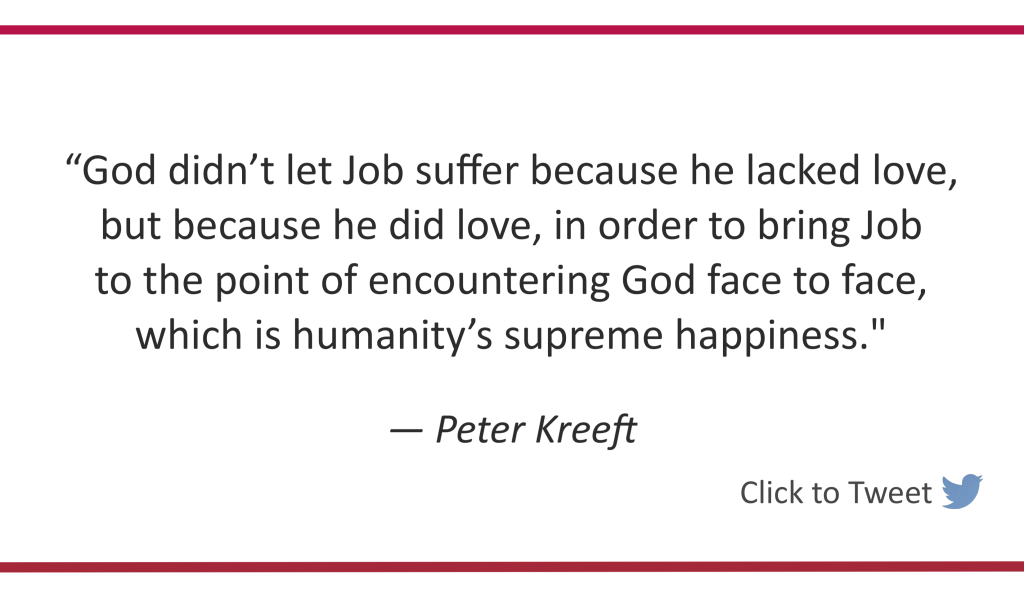Do God and Satan Alternate Shifts? (God’s Sovereign Rule, Part 5)

Do God and Satan alternate shifts controlling the world? It often seems like Satan has punched in as manager of the world, and God is never coming back from His break. Yet nothing could be further from the truth.
Psalm 103:19 establishes a foundational fact: “The Lord has established his throne in heaven, and his kingdom [his sovereignty] rules over all.”
God is sovereign. As we saw in part one, this means that He is the supreme ruler of the universe. He has ultimate control over all details. No one outranks Him. He rules independent of the control of any other being, even Satan. Absolutely no one has more control over the events of this world—over the events in your life—than God. In other words, the buck stops with Him.
Since God rules over all world events — large and small — this means that if a hardship touches our lives, it is because God has allowed it. It has been filtered through His fingers of love.
“What about hurtful actions of other people?” you ask. “What about pure evil? Is God the source of it? How can He be sovereign over it — how can He govern it — and not be the source of it?”
It seems to our human logic that one of two scenarios occurs. It seems that either:
1. God is in control, and therefore, when evil, tragic events occur, He is the source of them. – or –
2. When horrific, evil events occur, Satan has complete control over the world, and God has no choice in the matter.
Actually, neither scenario is correct. God oversees people’s sinful actions, but He is not the source of them. He can allow events to take place, where evil plays a role — without being the source of the evil Himself.
God does not originate everything He permits. He does not put evil in anyone’s heart. Such evil is the result of man’s innate evil desires and Satan’s fury. Even when suffering involves the work of the devil, Satan can only do what God allows.

Job’s Story: Evidence That God Does Not Originate Everything He Permits
Job’s story clearly illustrates this. Job had everything he could desire — money, land, possessions and family. He was a man of great standing — the “greatest man among all the people of the East,” the Bible says. (Job 1:3, HCSB)
One day the angels came before God’s throne, and Satan came along with them. God asked Satan,
“Have you noticed my friend Job? There is no one quite like him—honest and true to his word, totally devoted to God and hating evil.” Satan retorted, “So do you think Job does all that out of the sheer goodness of his heart? Why, no one ever had it so good! You pamper him like a pet, make sure nothing bad ever happens to him or his family or his possessions, bless everything he does—he can’t lose!
But what do you think would happen if you reached down and took away everything that is his? He’d curse you right to your face, that’s what.
God replied, We’ll see. Go ahead—do what you want with all that is his. Just don’t hurt him” (Job 1:6-12, MSG).
On the heels of this conversation came a tragic day for Job.
A servant rushed to Job with terrible news, “Sabean bandits stole the oxen and donkeys and killed the field hands.”
A second messenger ran in, “Bolts of lightning [probably igniting brush fire] struck the sheep and the shepherds and fried them—burned to a crisp.”
Before he finished speaking, footsteps of another running messenger could be heard. “Chaldeans came from three directions and raided the camels and massacred the camel drivers.”
While he was still talking, another messenger burst in with tragic news. “Your children were having a party at the home of the oldest brother, when a tornado swept in off the desert and struck the house. It collapsed and they all died.” (Scripture quotations from Job 1:14,18, The Message.)
Job’s reaction is exemplary. He fell to the ground and worshiped God saying, “The LORD gave and the LORD has taken way, may the name of the LORD be praised” (1:20-21).
We should all take a cue from Job’s correct response. He was able to bow in worship and praise God’s character because he understood God’s sovereign role in his tragedies.
Our focus in this post, however, is God.
- What is God’s role in our trials?
- Does God’s authority reign supreme over all the circumstances of our lives … or just over some?
- What is Satan’s role in our trials?
- Do God and Satan alternate shifts? Does God take the day shift and Satan the night?
Who caused Job’s trial?
Who caused Job’s trial? At the most basic level, natural forces did. These storms weren’t miraculous or rare. Such occurrences were common in that part of the world. No laws of nature were suspended. If television meteorologists had existed, they would have been on the local network news moments before warning of approaching storms. Bad weather killed that day.
At the same basic level, evil people caused Job’s trial. Criminal prosecutors would have sufficient cause to put these perpetrators behind bars. Greed along with a little desire for dark adventure motivated these criminals. They will one day answer to God for their appalling crimes.
At a deeper level, Satan caused the disasters in Job’s life. “Everything he has is in your hands.” God told him. The Bible doesn’t specifically say if Satan always influences the weather, but clearly, this day he had a hand in these storms. When it comes to the evil men in the plot, Scripture does say that “the whole world is under the control of the evil one” (I John 5:19, also 2 Cor. 4:4 and 2 Tim.2:26). Yes, the storms were natural events and the men acted true to their evil nature, but according to Scripture, Satan orchestrated it all. He will be punished for this in hell.
On the very deepest level, though, God authorized Job’s trials. Satan asked to destroy Job’s bubble of blessing and God signed the decree giving him permission.
“Is it not from the mouth of the Most High that both good things and calamities come” (Lamentations 3:38).
Job obviously knew who was ultimately in charge. He revealed this when he said, “The LORD gives and the LORD has taken away” and “Shall we accept good from God, and not trouble?” At the end of the book, Job received comfort after “all the trouble the LORD had brought upon him” (Job 1:21; 2:10; 42:11).
From the highest angle, nothing happened to Job that God didn’t ordain. But notice how it occurred. Satan acted of his own volition. No one forced him to do what he did. He wanted to destroy Job and embarrass God. All God did was merely “lengthen his leash,” as Steve Estes writes in When God Weeps. [1]
Estes writes concerning the Sabeans and Chaldeans,
“They didn’t start their day with private devotions, seeking God’s guidance, learning that he wanted Job’s herds stolen and servants butchered, and riding off on a holy crusade. They were just a bunch of good ol’ boys enjoying a drunken looting spree, savoring life’s simple pleasures. No divine arm-twisting there. As for nature, it got up on the wrong side of the bed as it often does, helped along by Satan in a manner we aren’t privy to. It got to howling and blustering—tossing some fire crackers, crumbling some building, frying man and beast. It didn’t know the difference. As far as science is concerned, nature didn’t color outside the lines that day. Following the laws of high-and-low pressure systems, electric al charges, and other scientific principles that nature itself didn’t understand, nature just…shall we say it?…acted naturally. [2]
God’s decree made room for these terrible events, but He did not perform them. In fact, He limited the heat of Job’s inferno of trials and steered the flames to accomplish results for Job’s long-range good.
Estes continues,
“[God] became a stowaway on Satan’s bus, erecting invisible fences around. Satan’s fury and bringing ultimate good out of Lucifer’s very wickedness. He exploited the deliberate evil of some very bad characters and the impersonal evil of some very bad storms without smothering anyone or anything. He forced no one’s hand, bypassed no one’s will, and (to our knowledge) suspended no natural laws. [3]
The Loving Purpose Behind Job’s Trials
So what was the good that came in Job’s life as a result of all the tragedies he endured? Was God just a cosmic sadist, or was there a loving purpose behind Job’s trials? At the end of the book a statement of Job’s is recorded. Job said of God,
“My ears had heard of you but now my eyes have seen you” (Job 42:5, emphasis added).
The word for “seen” in the original language means: to feel, to experience, to learn, to reveal oneself, to ascertain, to make one feel or know, to cause to enjoy; to gain understanding, to be fully aware.
Can you imagine ascertaining the creator of the universe – the God who spoke the world into being? In The Case for Faith, Peter Kreeft says,
God didn’t let Job suffer because he lacked love, but because he did love, in order to bring Job to the point of encountering God face to face, which is humanity’s supreme happiness. Job’s suffering hollowed out a big space in him so that God and joy could fill it.
As we look at human relationships, what we see is that lovers don’t want explanations, but presence. And what God is, essentially, is presence—the doctrine of the Trinity says God is three persons who are present to each other in perfect knowledge and perfect love. That’s why God is infinite joy. And insofar as we can participate in that presence, we too have infinity joy. So that’s what Job has—even on his dung heap, even before he gets any of his worldly goods back—once he sees God face to face. [4]

God not only permitted Job’s trial, He limited it. If God didn’t control evil, the result would be evil uncontrolled. [5] God is constantly restraining Satan’s work so that torment and destruction do not overcome us.
Occasionally, as in the case of Pharoah, Job, Joseph and Jesus, God lifts his hand of restraint and allows evil men to fulfill their desires only because it serves God’s higher purpose.
“God uses everything for his own ends, even the wicked
for a day of disaster” (Proverbs 16:4).
–
Tweetables
- “The Lord has established his throne in heaven, and his kingdom [his sovereignty] rules over all.”— Psalm 103:19
Tweet
- God rules over all world events — large and small. If a hardship touches our lives, it’s because God has allowed it. It has been filtered through His fingers of love.
Tweet
- God doesn’t originate everything He permits. He doesn’t put evil in anyone’s heart. Such evil is the result of man’s innate evil desires and Satan’s fury. Even when suffering involves the work of the devil, Satan can only do what God allows.
Tweet
- If God didn’t control evil, the result would be evil uncontrolled.
Tweet
- “God didn’t let Job suffer because he lacked love, but because he did love, in order to bring Job to the point of encountering God face to face, which is humanity’s supreme happiness.” — Peter Kreeft
Tweet
- “Is it not from the mouth of the Most High that both good things and calamities come.” — Lamentations 3:38
Tweet
–
Application Questions:
God sovereignly rules over all the events of this world, large and small. No one has more control over the events of this world—over the events in your life—than Him. If a hardship has touched your life, it’s because God has allowed it. It has been filtered through His fingers of love.
- What are the hardships in your life right now? Are they financial … or health-related … or problems on your job … or in a relationship? Who have you blamed for causing them? Satan … or a person … or simply fate?
God oversees people’s sinful actions, but He is not the source of them. He can allow events to take place, where evil plays a role — without being the source of the evil Himself. God does not originate everything He permits.
- How does it make you feel to know that even when suffering involves the work of the devil, Satan can only do what God allows?
God revealed Himself to Job, before Job’s fortunes were restored. God gave Job an experience of Himself. Afterward Job said, “My ears had heard of you but now my eyes have seen you.” Job experienced God. He ascertained Him … was made to know and enjoy and gain understanding about God.
Peter Kreeft says, “God didn’t let Job suffer because he lacked love, but because he did love, in order to bring Job to the point of encountering God face to face, which is humanity’s supreme happiness. Job’s suffering hollowed out a big space in him so that God and joy could fill.”
- For what good purposes might God have allowed your current difficulties?
- So that you might encounter Him face to face? So that you might experience humanity’s supreme happiness?
- So that you might be made more like Jesus? Or might be less attached to this fleeting, temporal world and more prepared for your eternal home?
- What other reasons?
OTHER ARTICLES IN THIS SERIES:
- Part 1: His Throne Rules Over All
- Part 2: Filtered Through His Fingers of Love
- Part 3: The Apple and the Alien
- Part 4: How Perspective Draws Victory from Defeat
- Part 6: God Governs Hands-On, Using Even Evil for His Purpose
- Part 7: His Purpose Prevails: God’s Control Over Sinful Acts
- Part 8: Biblical Evidence: Scriptures About God’s Sovereign Rule
- Resting in God’s Sovereign Rule: The Complete Series
RELATED ARTICLES:
- Overcoming Adversity 101, Part 3: What About Accidents?
- Overcoming Adversity 101, Part 4: The Long Ranger
- Overcoming Adversity 101, Part 5: Is God Good and Loving?
- Overcoming Adversity 101, Part 6: A Few Reasons Why
- Overcoming Adversity 101, Part 7: A Few More Reasons Why
- Overcoming Adversity 101, Part 8: Ten Final Reasons Why
- Overcoming Adversity 101, Part 9: Sovereignty vs. Healing
- Joni E. Tada and Steve Estes, When God Weeps (Grand Rapids, MI: Zondervan, 1997), 79
- Ibid., 79
- Ibid., 80
- Lee Strobel, The Case for Faith (Grand Rapids, MI: Zondervan, 2000), 69-70
- Tada and Estes., 84

Disclosure of Material Connection: Some of the links in the post above are “affiliate links.” This means if you click on the link and purchase the item, Shades of Grace will receive an affiliate commission. Regardless, I only recommend products or services I use personally and believe will add value to my readers. I am disclosing this in accordance with the Federal Trade Commission’s 16 CFR, Part 255 “Guides Concerning the Use of Endorsements and Testimonials in Advertising.”






 “Natalie Grace Nichols is experiencing God’s grace and freely expressing it. My wife, Betty, and I thank God for the ministry of Jesus through Natalie.”
“Natalie Grace Nichols is experiencing God’s grace and freely expressing it. My wife, Betty, and I thank God for the ministry of Jesus through Natalie.” “I’m so thankful that God is raising up women like Natalie for a new generation, providing biblically balanced teaching, encouragement, and comfort for people who are enduring life’s trials.”
“I’m so thankful that God is raising up women like Natalie for a new generation, providing biblically balanced teaching, encouragement, and comfort for people who are enduring life’s trials.”